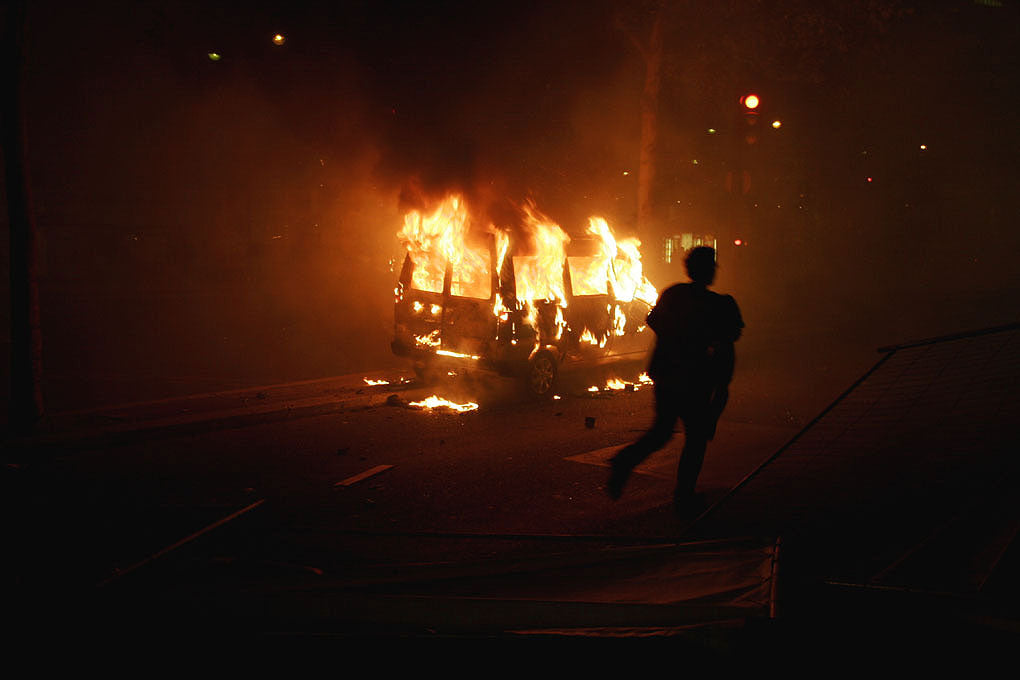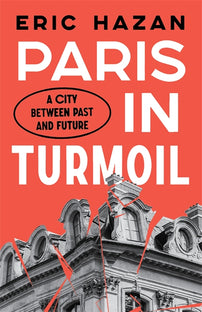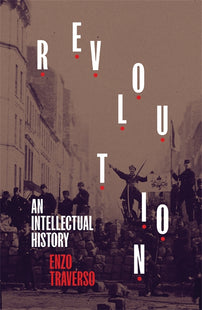Making Fires Does You Good
Author Diaty Diallo on the lessons of street action and fire building in Paris during the protests against Emmanuel Macron’s pension reforms.

Building fires in the street, it’s emotional.
It allows you to shed light, to decorate. It spreads garlands.
It sets out landmarks, like a fragmented home, it offers a little comfort.
It keeps you warm.
Building fires allows you to externalize what consumes us on the inside.
Building fires, it does you good. Good fires, good sentimental blazes, the kind that allow you to recognize yourself in the fog of the moment, to know you’re somewhere.
It does you good.
Building fires in the street, it’s functional.
It serves to invoke, to summon.
In demonstrations, permitted or unauthorized[i], in city centers or surrounding areas, some light up garbage or street furniture in order to summon the strong arm of the system that they oppose.
Summoning the strong arm, the force of order, it’s a means to make power show itself. To make it come closer to try to clear it out.
To draw it out in order to show it that it was never invited.
Some summon the force of order as though invoking occult and evil spirits to exorcise them from a body or a house.
We summon the force of order so we can cause trouble, accidents, to paralyze, sabotage, disorganize.
Making power appear allows you to fight it with symbols.
Or at least to give the illusion of it.
And this illusion makes us stay focused: the force of order and the cogs it conceals are as massive as they are vicious.
Do you remember your toxic ex, the king of the gaslighters? The force of order is a bit like that.
I realized something recently. Our schemes aren’t cunning enough, and I have the impression that they’ve understood it. Understood that it’s all just a story of appearances and disappearances.
The demonstration, by its declaration alone – « we will demonstrate on Thursday from here to here » – justifies the prefecture’s deployment of massive apparatuses for the maintenance of order.
The demonstration makes the police and the army appear.
The police and gendarmes, they make the demonstration disappear by chasing it away, by gassing it, beating it, in brief, by dispersing it, we know this well.
But lately, I’ve observed a curious phenomenon – but not a new one : an alternation between a series of demonstrations characterized by the intensity of the violence deployed by the force of order—physical, verbal, and those weapons that we know too well—and then others where officers don’t seem held to the same orders, where there is a dead calm, not because there is less conflict sowed by demonstrators, but rather because the officers make themselves discrete, more focused on unintelligible strategies to divide the crowd – to cut it, slow it down, break it up, knock the procession off course – than on beatings and gassing – even if they always throw a few blows towards the end, for good measure.
In this second case, the demonstration often seems inhibited and flavorless: it’s missing something. By being forced to rub shoulders with the force, we have become accustomed to it. We have associated the feeling of demonstration—grouping up, being-in-resistance––with surveillance, shadowing, compression, and pain. So when these symptoms disappear, the feeling disappears along with them. It can create the illusion that the movement has lost its breath.
It’s a clever means that they have to dictate our behavior, to control us, to force us. Like cruel parents with troublesome children. And we’ve read this fabulous phrase on the walls: « The Riot Police are not our sons, signed, The Whores, » so let’s not forget that we’re not the offspring of such worthless progeny either.
And that we appear and disappear when we please.
Flee the gaslighting, light up the barbecues
[book-strip index="1" style="buy"]
The movement against the pension reform bill will have been historic, and will have showed us that we could once again hold our own in numbers and go the distance.
The last time it happened was at the end of 2019, with a tense strike movement which spread out over weeks.
What the fuck have we done in the meantime?
There’s been a lot of craziness, though!
The unemployment insurance reform, the Global Security Law, the asylum-immigration bill, the education and teaching reforms, to name only these.
These and inflation.
These and the fact that it has become completely normal to lose an entire part of our elderly population each summer.
These and those assassinated by the police or by prison administration.
These and those killed on the construction sites of Grand Paris.
These and the all the civil servants who committed suicide..
These and an entire class which perishes in silence, care workers, clickworkers, sex workers, security workers, cleaners, dealers, documented or not, with or without employment. These and all those who slowly croak working in dangerous conditions, with weight on their backs or toxic fumes in their sinuses.
And yet there were deaths.
And yet there was live ammunition fired.
Right before our eyes.
In the middle of the city, two steps from the terraces, right by the tourists, in the most beautiful city in the world, bullets. Real ones. Fired. On the night of a disgusting election.
There were bullets.
[Whether] Real or ‘non-lethal,’ others are fired at the very moment that these lines are written, on the land and in the bodies of the people of Mayotte, an island colonized and literally stolen by France.
What the fuck are we doing today, then?
Why do we hear less from us on these issues?
Here, though, so many aspects of the same problem, from the same oppressor. But most of the time, we wait. We wait. For an opportunity, the next one.
The next opportunity that we’ll have to show that we stood up, that we marched, that we didn’t remain silent this time, that we reacted.
But wouldn’t you rather we go back to proposing things?
It worked well during the Yellow Vests, for example.
First the meetings were regular, consistent, come wind or snow.
No matter what he says on TV, that other guy.
We didn’t give a fuck about their bullshit statements.
We had nothing to say to them, nothing to declare to them – least of all the routes of our demos.
It was a beautiful, freewheeling period.
And then, we occupied the square, and there we thought, we proposed, formulated, we dreamed. We tried to make the commune again, we didn’t succeed but we created memories in common, a communal experience and some attempts at converging our struggles. Nothing crazy, but it was something.
And then some among us, discovering the violence of the force of order, issued apologies to those who have always been subjected to it. Symbolic, but it was something.
And then that worked well too, because there were a whole lot of other activities, physical, manual, or cerebral ones, which allowed us to finally rid ourselves of the ever-repeated. authorized marches through the Haussmannian milieu.
Because an authorized demo is a tool, a fundamental one, certainly, but nothing more. And for us, children of the HLMs,[ii] children of immigrants, children of the working classes, it’s a tradition that’s not always part of our folklore. For us, contestation, mobilization, but (even) more still organization, take place every day and by other means: collectives, charitable organizations, cafes, helplines, kitchens in shelters or community centers, cafeterias, pétanque or dominoes, neighborhood parties, patrols, etc.
In this respect, the Belleville neighborhood in Paris, where I’ve knocked around for quite a while, is exemplary for its initiatives : la Perm; Pazapas; the Brigade des mères; the Cantine des Pyrénées; a copwatching committee; to list only a few.
All actions carried out by residents, ex-residents, neighbors, workers, for all those who live there, and open up just as many spaces of retreat, debate, learning, eating, tournament, mutual aid, culture, socialisation, festivities, and just as many points of assembly and resistance.
You should see a demo set out from la Cantine and be picked up by the Black Vests at the Foyer Bisson to unite with the folks from Montreuil at Père-Lachaise.
You should see the amphitheater at the parc de Belleville packed with young people singing so loud in unison that you can no longer hear Vegedream.[iii]
In these spaces, in the XXth arrondissement or elsewhere, we propose, we act, day after day, we prepare, we repair, we protect, we fight to preserve what the state progressively shreds to pieces: decent housing, decent food, decent education and breathable air for all. We fight to keep alive what they seek to destroy.
We lost (the battle). We caught our breath. The hysteria isn’t over yet.
[book-strip index="2" style="buy"]
Ok, we lost.
We lost.
But we gained something along the way: a new degree of intensity and urgency in the way we want to care for the world and all that lives in it.
And know that we can go the distance.
And that we’ll still be here in the evening.
And that we’re capable of returning the next day.
And that we know ourselves.
We lost.
Maybe we need to stop waiting for the final straw to start marching. Maybe we ought to prepare ourselves not to react but to overreact to all of the other straws which lead up to it. If the force of order is like all toxic exes, kings-of-the-gaslighters, come! Let’s give them what they think we already are.
Come, we’ll act like hysterics.
Come, we’ll shift the revolution from a possibility in our crosshairs to a radical animal instinct. Come, we'll keep it going; come, we'll work on it; come, we'll go crazy, we'll suffer it, we'll endure it like marathon runners.
Come, we’ll embrace each other with it, we’ll burn together from it, we’ll pass it around like the Olympic flame. Come, we’ll keep it lit, perpetually at hand—we too can be armed.
Come, we’ll pass it all the way to the cauldron.
Come, we’ll never stop as long as they don’t stop. For real.
Come, we’ll tell them. We’ll tell them that “it’s too late,” that disorder? We’ve always had it in our DNA, we’re surrounded by the spirits of Black maroons and the ghosts of communards. By the mornes,[iv] the maquis, the ZADs, the barricades, déboulonnages and machine sabotages. By the dispersed, the deported, the strikers dead of hunger, the immolated. By all the first November mornings and all the last October evenings.
France has always waged war against its people for secular, imperialist, colonial, racist, capitalist reasons—all resolutely fascist.
History is a chain.
Let us bang on the floor until it finally gives way.
Let them continue to ignore the sound*
*It will get louder and louder with all these pots and pans.
Translated by Patrick Lyons and Pierre Folliet.
[book-strip index="3" style="buy"]
[i] The original French reads sauvage.
[ii] HLM stands for” habitation à loyer modéré,” literally translated to housing at moderate rent.'
[iii] Vegedream is a French rapper.
[iv] This refers to hills on the littoral of Caribbean and Indian Ocean islands where maroon slaves sought refuge. By extension, it has come to designate certain coastal hills in all the islands of former French colonies. The word originally stems from Antillean creole.




